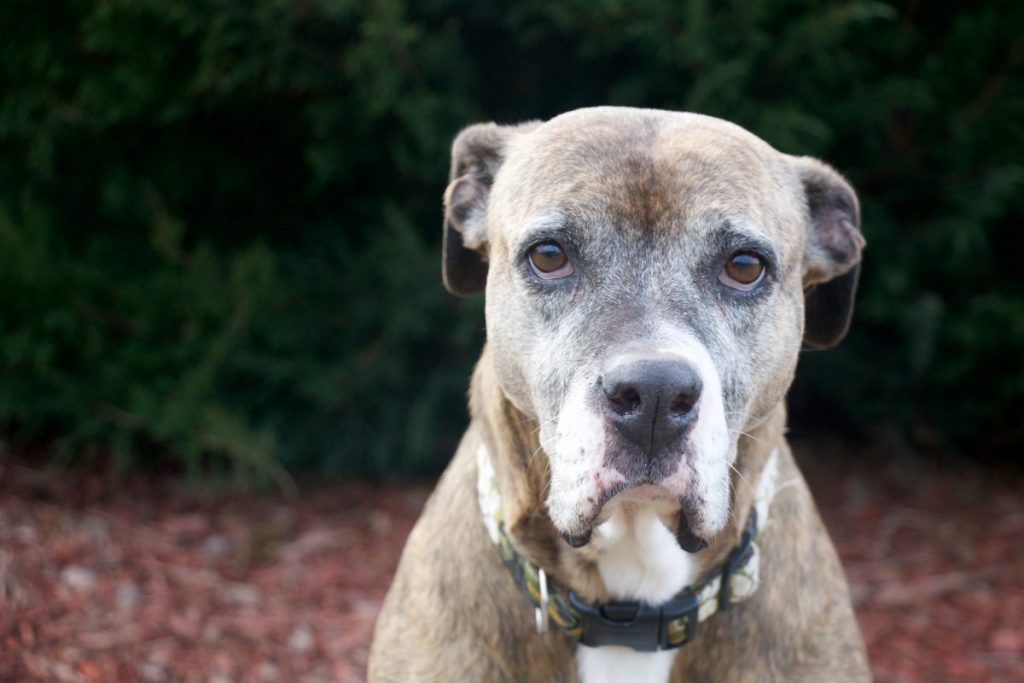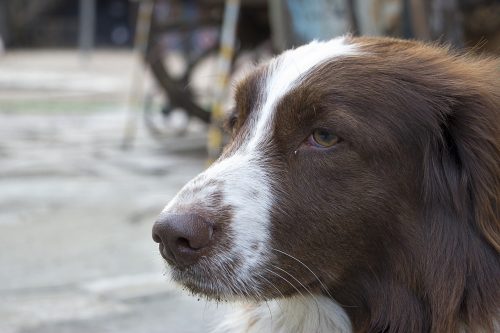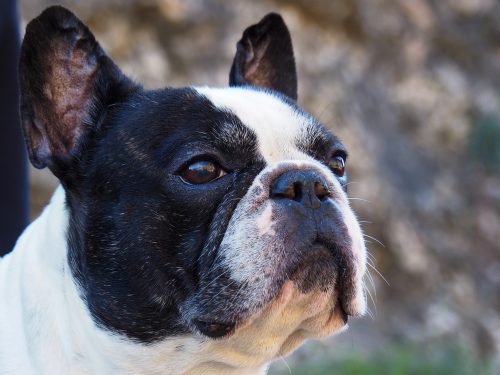While it isn’t totally known if dogs can feel and understand grief, there are several moments that would make you think that they do. One particular moment that stands out is the dog that wouldn’t leave the side of his Navy SEAL owner’s casket while it was draped in the American flag. There have been several such moments through the years that really make you question a dog’s ability to comprehend death.
No matter what you believe, there will be observable behavioral changes in your dog after his companion dies. These will often be minor and go away within a short period of time, but other personality traits have been known to emerge after a companion passes away.
How Can You Tell if a Dog is Mourning?
It’s hard to know what a dog might do when and if he is grieving, as no two dogs are the same, but there are some seemingly common signs you can look for. Some may appear to be visibly sad while others may carry on with their lives as if nothing happening.
But dogs generally do seem to react to any major change in their environment. Whether that be a move to a new home, an introduction of a new child, or the death of another family member or dog. When the dogs are socially bonded together, there will more often be signs of depression in the surviving dog, and they may last for longer periods of time.
Some of the signs that your dog is in mourning may include a loss of appetite and lowered water intake, a general lethargy and slowed response to humans and other animals, a loss of interest in his normal play and activities, or even an actual howl from time to time. In some cases, these signs of grief can increase gradually over the following weeks to months. In these cases, you should play it safe and bring your dog in to see your veterinarian to rule out any physical illness, which a dog can develop due to the physical symptoms of mourning seen above.
Some dogs may also have changes in their sleeping patterns, especially if they typically slept or napped with the other dog. They may seem reluctant to ever be in a room alone or be more anxious if you leave them at home alone. Some may even seem to wander the house or yard looking for the other dog.
Other dogs may exhibit changes in their personality. Consider the dynamic between your animals when they were together. If the dog that passed away was the leader of the pack, your remaining dog may now feel like he has to take on that responsibility. Your dog may see a boost in his confidence and be more confident and outgoing as well as being more vocal.
However, it can go in the opposite direction as well. If your remaining dog was the more timid of the group, he may fall further into his shyness and be even more reserved. His companion may have provided him with social confidence, and losing them can cause him to go into his shell. This will take some TLC to help your dog come back to his normal state.
Still, other dogs who lose a companion will show now signs of mourning at all. It all depends.
How to Help Your Dog During the Grieving Process
Knowing that your dog may be capable of showing its grief, you also have to realize that you are responsible for helping your dog through the grieving process, just like the rest of your family. Fortunately, there are plenty of things you can do to help your dog in mourning.
Help Your Dog Understand That the Other Dog Has Died
This may seem a bit macabre, but some veterinarians do recommend that you bring your dog along if you need to euthanize the other. It may help the dog understand that the other has died and is not coming home if he is present during the dog’s passing. If that’s too much, you can let the animal see and smell the other dog’s body after it has died.
There is no concrete proof to this, and there may be no obvious reaction in your dog, but it may help your dog understand that the other is not coming back and he doesn’t need to search around when he gets back home.
Stick to Your Normal Routine
Changes in your behavior and routines after the death of a dog affects your remaining pets. Whether a dog feels grief or not, your human family will definitely feel the loss. Of course, a period of grieving is completely understandable when you lose a beloved family member, but keep in mind that you still have another dog to care for, a dog that’s life is entirely based on his routine. That’s a routine that you’re going to need to stick to in order to make sure that your remaining dog stays healthy and happy.
In fact, sticking to your routine is probably the best thing that you can do for your remaining dog or dogs. This is because whether or not he feels grief, he will feel stress over changes to his routine and in the household. Keeping your furry friend on the same routine even though he has lost his companion will keep his stress levels down and adjust to the loss. This includes feeding times and walking times. Whatever activities you normally did with your dogs, continue to do so with your remaining pet.
Grief may stick with your dog, but there is nothing they can do about it. Just like animals in the wild, they have to keep going, just like humans do.
Keep a Consistent Diet & Mealtimes
This obviously feeds into the dog’s routine, but it goes a step further. Even though a dog in mourning may be reluctant to eat, you still need to keep him on the same feeding schedule and diet. Allowing the dog to eat when and what he wants will create a picky eater. Continue to offer the same food at the usual times, and your dog should adapt back to his normal eating schedule.
If he is reluctant to eat at first, store what he doesn’t eat and use it again at the next meal time. Resist the temptation to feed off schedule or give your dog more treats than usual. His hunger will be the motivation to get him back on him routine.
However, if the dog doesn’t start to eat regularly again after a few days, you may need to see your veterinarian in order to rule out a health problem.
Increase Your Dog’s Exercise & Mental Stimulation
When a dog loses his companion, he may have lost his daytime playmate. Unless you have cameras set up around your home, it’s hard to know what they do together when you’re away at work. But whatever it was, the dog that passed away most likely played a large role in your remaining dog’s daily life. Whether they played together or napped together, losing his companion can leave your remaining dog feel bored or anxious. To help this, you can increase your dog’s activity level.
Provide your dog with more exercise and mental stimulation. Get some new toys, work in an extra game or two of fetch or tug of war, or even just add in an extra walk. Teach him some new tricks. Some more stimulation can go a long way to help keep your dog happy and also perhaps forget and get over the loss of his companion. Be sure that whatever you do, you work new activity in moderately and around his normal routine, so as not to shuffle things up too much.
Don’t Reward Depressive Behavior
This may seem like a cold tip, but coddling a dog too much when he seems depressed can cause an unintentional adverse effect, and make the dog think that he is being rewarded for the behavior. Since you don’t want it to continue, do not overly coddle your dog or treat him for seeming sad. Instead, opt for the extra activities mentioned above.
Allow Time for Your Surviving Pets to Establish Their New Social Structure
When you have more than two pets in your family, the animals will each have their own specific relationships with each other animal in the group. When one of them dies, this will change the entire group dynamic, creating a new instability in the social structure of your home. This can cause new and surprising conflicts that may seem like cause for concern, but unless the animals are becoming violent toward one another, you should not intervene. Let them reset the dynamics of the group on their own.
However, if the concerning behaviors continue for a while after the group creates its new relationships with each other, you can seek your veterinarian or an animal behaviorist for guidance.
Try Not to Worsen Your Dog’s Emotional Response
Studies have shown that dogs can pick up on human emotions, so when you and your family are dealing with your own grief, you should try to be sensitive to your remaining dog. Having extreme emotional responses can accentuate your dog’s emotions as well and make him more upset. There’s generally no harm in seeking comfort in your surviving dog, but don’t do anything that might frighten them or cause them any additional distress.
Remember, Grief Takes Time
While it isn’t known how long a dog’s memory lasts, it seems that they do remember loved ones and their companions for some time. Depending on the dog, this can last days, weeks or months. Most dogs will, with time, return to their normal selves, so it’s important to be patient.
When Should You Get Another Dog?
When you lose one of your dogs, one of the first things you might think to do is to get your remaining dog a new companion as soon as possible. But that isn’t something you should jump right into. You should make sure you’re ready to take on another dog. Remember, you aren’t getting a perfect replacement. A new dog is a lot of work, so you need to be absolutely sure that you’re ready for the responsibilities and commitment that a new dog requires.
Think also about the fact that a new dog will require much of your attention, which will also be confusing to your current dog. It may have just lost his companion, but adding a new dog to the mix may sap more of his attention away and create stress, rather than put him at ease.
You also need to be sure a new dog will be agreeable with your current dog. Your remaining dog may not form the same relationship with the new dog that he had with your dog who passed away. It might be a good idea to take your dog to the dog park and see how he interacts with other dogs without his companion. This may tell you if he is ready for another.
If you do decide you’re ready for another dog, you will definitely want to bring your current dog along to help you choose a new companion. It is imperative that they get along, and having them meet beforehand will give you the best chance for them to get along.
Sources:
- Bender, Amy. “Do Dogs Grieve Over the Loss of Other Pets?” The Spruce Pets, Accessed 3 May 2017. www.thesprucepets.com/dogs-and-grief-1118470.
- “Do Dogs Grieve Over the Loss of an Animal Companion?” Psychology Today, Accessed 3 May 2017. www.psychologytoday.com/us/blog/canine-corner/201611/do-dogs-grieve-over-the-loss-animal-companion.
- “Dog in Mourning: Helping Our Pets Cope with Loss.” Cesar’s Way, 18 Aug. 2016, Accessed 3 May 2017. www.cesarsway.com/dog-behavior/problem-behaviors/a-dog-in-mourning-helping-our-pets-cope.
- Becker. “10 Ways to Help Your Grieving Pet.” Healthy Pets, Accessed 3 May 2017. www.healthypets.mercola.com/sites/healthypets/archive/2015/09/19/helping-surviving-pet-deal-with-loss.aspx.
- Strollo, Naomi. “Helping Your Dog Understand the Loss of Their Canine Companion.” PetMD, Accessed 3 May 2017. www.petmd.com/news/view/helping-your-dog-understand-loss-their-canine-companion-35287.










